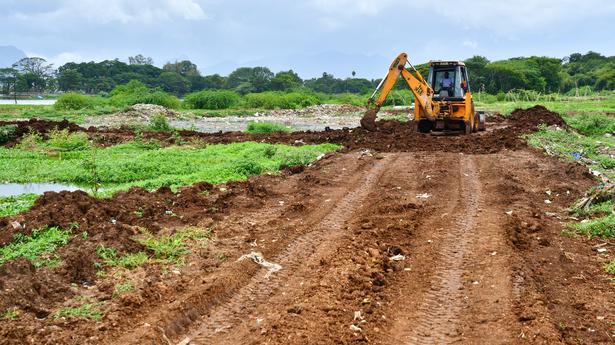
Smart Cities works destroy wetland ecosystem in Krishnampathy tank in Coimbatore
The Hindu
COIMBATORE The Smart Cities Mission works, including development of roads and bunds, in Krishnampath
The Smart Cities Mission works, including development of roads and bunds, in Krishnampathy tank at the behest of the Coimbatore Corporation have destroyed the wetland ecosystem, allege nature enthusiasts.
Though the damage caused to the wetland ecosystem was brought to the attention of the authorities, the works continue. There is no scientific study or assessment on the impact on birds and several other creatures that inhabit the waterbody, they claimed.
A researcher told The Hindu edges of the tank, which used to have shallow waters that were very important for shore birds, had been dug into deep pits. The mud removed had been used to lay roads and bunds inside the water body. Further, concrete pathways had already been built around a major portion of the tank which bordered Poosaripalayam Road and Sundapalayam Road. The researcher pointed out that unscientific digging and creation of deep pits might also prove fatal for people who ventured into the tank.
In the Asian Waterbird Census held in January this year, Krishnampathy tank had topped the list of 29 wetlands in the district in terms of bird variety and population – 88 species and 1,065 birds counted. The tank is also a breeding habitat of several waterbirds including Bronze-winged jacana, Painted-snipe, Common coot, Cormorants, Spot-billed duck, Eurasian Moorhen, Grey-headed Swamphen.
Sources with the Corporation said the plan was to construct a natural water filtering system by creating layers of bunds. The system would prevent solid waste, including plastic, from entering the tank, the sources said.
K. Mohanraj of Save Coimbatore Wetlands said that accumulation of solid waste in tanks was the result of improper waste management by the Corporation. Had the solid waste collected properly, they would not have entered waterbodies, he said.
“Similarly, household sewage should ideally be carried to treatment plants through underground drainage. But domestic sewage is let into tanks now,” he said.

Describing the Special Intensive Revision (SIR) drive under way in Bihar as “an invasive reconstruction of the electoral roll,” Dipankar Bhattacharya, general secretary of the Communist Party of India (Marxist-Leninist) Liberation, said States including Kerala should be on guard as it could be applied in other parts of the country as well.





















 Run 3 Space | Play Space Running Game
Run 3 Space | Play Space Running Game Traffic Jam 3D | Online Racing Game
Traffic Jam 3D | Online Racing Game Duck Hunt | Play Old Classic Game
Duck Hunt | Play Old Classic Game










